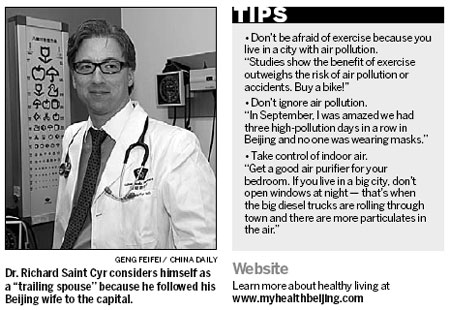Doctor finds a home in China, and online
Updated: 2011-10-30 07:49
By Todd Balazovic (China Daily)
|
|||||||||||

Leaving the rolling green hills of California's serene wine country to head to the Far East was a bitter pill for Dr Richard Saint Cyr to swallow.
The 42-year-old physician of family medicine at United Family Health in Beijing had his ideal job six years ago: working with impoverished Americans at a clinic nestled among the lush vineyards of the Sonoma Valley. He was fulfilled with his work, loved where he lived and was active in the community. It was his paradise.
So when his Beijing-born spouse asked him to take a leap of faith and move with her back home, Saint Cyr was hesitant because China was "so far away, not just physically, but mentally as well".
But matters of the heart prevailed. In 2005 Saint Cyr moved to Beijing, securing a job with the International Medical Center and acquiring the title "trailing spouse", a moniker he light-heartedly embraces.
While Saint Cyr says he was ready for a challenge, he didn't foresee the difficulty he would face connecting with the community in a bustling city of nearly 20 million people after life in close-knit Sonoma.
As expats, he says: "We're all here in a city that doesn't speak English as a native language, in a culture most of us are unfamiliar with."
His solution was to create a direct channel to his audience, bringing his medical expertise to Beijing expats through China's rapidly expanding online community.
Combining the skills learned while earning an English degree and his medical certification, Saint Cyr took to the web, founding the My Health Beijing blog in 2009. It was China's first and now one of the most popular English-language health blogs aimed at expatriates living in the capital, he says.
He wanted to provide a place for nervous expats to go and find reassurance and credible information. He also reached out to the Chinese community by creating an account on the Chinese micro-blogging website Weibo.
Saint Cyr now posts daily, tackling a mix of major health concerns. Air pollution and food safety information are among his most-read posts - as well as smaller concerns such as whether or not TCM massages prove beneficial for back pain (he says they do) or why bike helmets are such a rare sight in one of the world's cycling hotspots.
The blog, a non-profit venture that he writes in his spare time, now receives more than 8,000 hits a month.
"By far the most popular moment of the website was during the radiation scare," he says, referring to Japan's earthquake-striken nuclear site. False rumors that consuming large quantities of the salt could help ward off the effects of radiation prompted thousands of Chinese to rush to supermarkets for the iodine-rich condiment in March.
"I went into high-gear in Chinese and English to explain to people the actual truth about what was going on," he says.
Saint Cyr immediately wrote a blog post titled "Don't eat table salt for radiation protection, It can kill you", warning that not only does salt have no effect on blocking radiation, but consuming too much salt can be fatal.
"Hundreds of Chinese people were e-mailing me back saying 'Thank you for doing that'," he says.
The blog's popularity and the doctor's boosted presence in the Beijing social sphere prompted his employers to make him a new offer: a position as a director of marketing for United Family Hospitals.
Now he's eager to help teach doctors throughout China how to cross the barrier into social media.
While many medical professionals are skeptical about engaging in social media, fearing it may detract from the number of patients they would see in person, Saint Cyr dismisses any criticisms as unfounded.
"If anything, I've proven that free advice is good business. Clearly there's been a lot of new patients showing up to the hospital because of the website. Indirectly it's been very good business," he says.
Saint Cyr says it's a career twist he never would have experienced were he still living in the US.
"There's still kind of a 'Wild West' mentality in China where new things are discovered daily," he says.
And, while the concrete confines of China's capital may be far flung from the green pastures of California's wine county, Saint Cyr said he'd find it hard to go back to his old life.
"If I was in America still I would probably be at the same clinic, I would probably be working at the same hospital just slowly climbing the salary scale," he says.
"I guess I could say I'm convinced now - I've got the expat bug."
You can contact the writer at toddbalazovic@chinadaily.com.cn.
China Daily
(China Daily 10/30/2011 page5)











